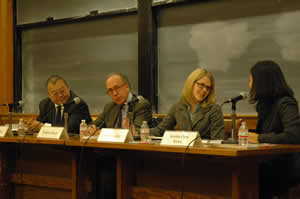
On Friday, November 2, the Council on East Asian Studies held a special roundtable discussion on “China and the American Election,” with support from a Title VI National Resource Center Grant from the U.S. Department of Education. Originally planned as part of the October 29, 2012 CHINA Town Hall, organized in coordination with the National Committee on U.S.-China Relations, the Yale roundtable was rescheduled due to Hurricane Sandy. CHINA Town Hall is a national day of programming involving 50 cities throughout the United States that features local speakers and a live webcast from Beijing of a conversation with the U.S. Ambassador to the People’s Republic of China. Jessica Chen Weiss (Yale University) moderated the Yale event, which explored the broader context of political sound bites and implications for the future of U.S.-China relations. She was joined by three panelists, Erika Fowler (Wesleyan University); Stephen Roach (Yale University); and Jeremy Wu (Member, Committee of 100, and former Senior Advisor, U.S. Census Bureau).
With China recurring as a hot topic during the election season, the panel focused on examining Chinese investment and trade practices, historical perspectives on currency policies, campaign dynamics and advertising trends, and American attitudes toward China. The participants deconstructed the dynamics of the campaigns of both Democrats and Republicans, while also positing questions on how key issues might be dealt with after the election. Professor Roach commented on the opposing stances the presidential candidates held in regard to China trade and the overall policies that have guided economic negotiations under different administrations. Professor Fowler explained the structure of campaign advertising and explored the powerful motivations behind exploiting China as a key issue of debate when considering American perceptions of current economic challenges in the United States. Dr. Wu drew from his wealth of experience working on building U.S.-China relations and spoke about changes over time, not just within the political or economic spheres, but also social progress in the United States related to the treatment of and sentiments towards Chinese Americans. The roundtable was followed by a Q&A session with the audience.
Many of the audience members had varying amounts of experience with China and several questions were raised about what one can do to help further U.S.-China relations at this important crossroads, considering possible leadership transitions both in China and the United States. All panelists agreed that engagement is crucial so one can strive to be an informed global citizen, whether it is as part of an Asian-affinity organization, as a professional who conducts business between the two countries, or as a student who is learning the language and spending time abroad. In an increasingly interconnected age, this is a question that must be contemplated at all levels of society, especially when political ads and two-second sound bites in the media might be the only form of “engagement” that some Americans have with what they believe to be an accurate representation of China. The audience and panel discussed the critical need to have China taught throughout the U.S. education system and covered in the U.S. media more comprehensively. The event concluded with a rallying cry for all those to consider what they can do on an individual-level to promote continued dialogue and exchange to enhance the future of U.S.-China relations.
The public roundtable was followed by a special, day-long, K-16 outreach program on Saturday, November 3, titled “Uncovering Local Connections in U.S.-China Relations: A Workshop for Educators on Engaging China.” Fourteen educators participated from public and private schools and community colleges across Connecticut and New York. The program provided educators with information and teaching materials to give local context and a layered understanding of U.S.-China relations, from national policy to people-to-people interactions between American and Chinese individuals. Moving beyond the campaign rhetoric and sound bites heard on television, the program featured an overview of current developments in U.S.-China relations; American and Chinese student perspectives on living, working, and studying in the other country; local business experiences with Chinese trade and investment; non-profit organization engagement; and resources to use in the classroom. Teachers also engaged in a micro-talk activity on issues in U.S.-China relations where they prepared short presentations and shared resource ideas for the classroom on topics, including China’s one-child policy, pop music and culture, fast food restaurant ventures, development and tourism, and educational exchange programs. The outreach workshop was sponsored by the Council on East Asian Studies at Yale University with National Resource Center Title VI Grant support from the U.S. Department of Education, in collaboration with the National Committee on U.S.-China Relations Public Intellectuals Program.
